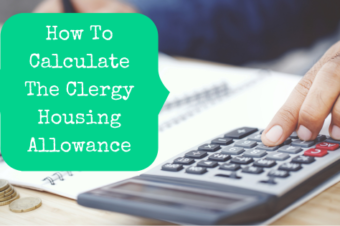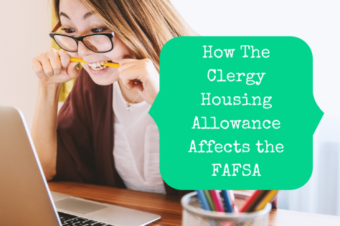As we all know, nothing went quite as expected in 2020. In fact, for most of us, nothing went anywhere close to expected! Maybe you were planning on doing some work on your home and things got shut down because of COVID-19. Perhaps you were planning on spending some money on items for your home, but COVID-19 made you tighten your budget. Or things just didn’t go according to plan and it had nothing to do with COVID-19! (But we’re blaming everything on COVID-19 these days, right?)
While altering your plans is always annoying, it is a bit more significant for pastors when it comes to housing expenses. At the beginning of the year, you have to carefully estimate your yearly housing expenses in order to avoid paying taxes on them with the clergy housing allowance. You meticulously calculate your anticipated rent, utilities, home purchases, and big projects.
And then something like this happens. The whole world hits pause. Your plans get tossed by the wayside and your expenses were lower than the housing allowance that your church gave you. You should have been paying taxes on some of that money and you didn’t.
Now, what do you do?
Excess Housing Allowance Is Taxable Income
What the housing allowance is is a provision that allows you to exclude your housing expenses from gross income for federal tax purposes. At the beginning of the year, you tell your church how much of your income you plan to use for housing and that amount is not reported to the IRS as income.
However, if you don’t use it all for housing by the end of the year, you need to let the IRS know and pay federal income taxes on the rest. Let’s see what that looks like in real life.
Say your church pays you $60,000 a year. You designate $25,000 of that as a housing allowance so your church only reports to the IRS that you had $35,000 of taxable income.
If you only spend $22,000 on housing for the year, you have an extra $3,000 that you should have paid taxes on but didn’t. You need to add that extra $3,000 of housing allowance back into your income and pay taxes on it. Not doing so is tax evasion and will get you into trouble if the IRS audits you.
How To Report Your Excess Housing Allowance
So, how do you report it as income in order to pay taxes?
Add it in with your other wages on line 1 of your Form 1040. Then, on the dotted line next to it, write, “Excess allowance” and the amount. Here is an example:

Yes, it is as simple as that. Now it is added in with your wages for when your taxes are calculated.
That’s how to include it for income taxes, but what about SECA, your Social Security and Medicare taxes? Well, you don’t have to worry about that at all. Because you always have to pay SECA taxes on your housing allowance, claiming too much won’t make any difference in what you have to pay. You are already paying the full amount on Schedule SE.
What You Can Do Differently For Next Year
Now, while ending the year with excess housing allowance may have made your heart skip a beat and worried you a bit, it wasn’t that bad, was it? With such an easy way to correct it, it’s often better to err on the side of claiming too large an allowance than too small.
Too many pastors don’t claim a large enough housing allowance and end up needlessly paying extra taxes. The best way to avoid that and limit your tax bill is by overestimating your yearly housing allowance.
There is one thing I need to note, though. There is a potential downside to overestimating your housing allowance.
Things To Watch Out For
Your housing allowance lowers your gross income for federal tax purposes and there are some important things that are limited by your gross income. The biggest one that most pastors need to watch out for is the refundable portion of the Child Tax Credit. Claiming too much of a housing allowance can actually limit the amount of money you can get. This article explains why. Contributions made to retirement accounts are also calculated and limited based on income. There is a chance that by overestimating your housing allowance you could negatively affect the amount of money that you can save for retirement.
Make sure to look into those two things before blindly following my suggestion that overestimating is better than underestimating. Remember, just because you read something on the internet doesn’t mean it’s necessarily best for your unique situation.
Now that you’ve fixed last year’s housing allowance, what about this year’s? Is it already approved by your church with an accurate estimate or overestimate?
If not, you’d better get on it! The housing allowance cannot be used retroactively, so every day you procrastinate is another day that you are paying taxes on your housing allowance unnecessarily. If you need to make a change, make one. The IRS does not limit the amount of changes you make to your housing allowance or the timing of them, as long as they are done proactively.


















